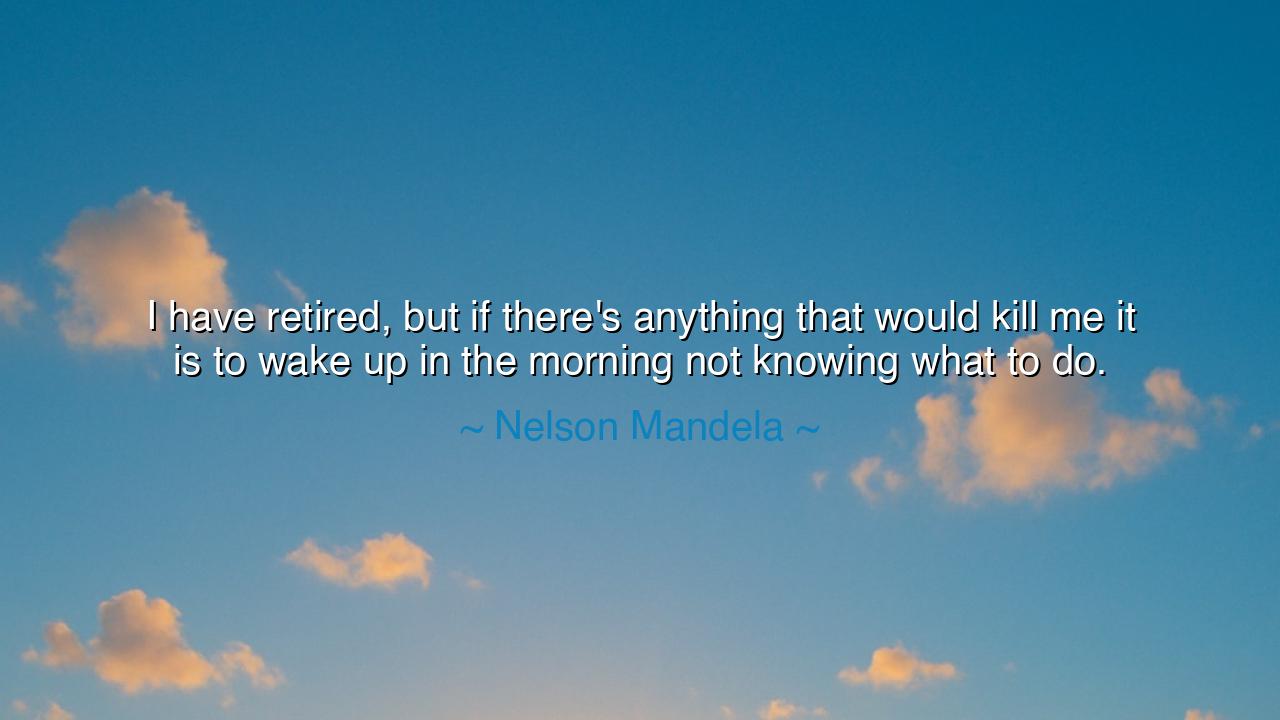
I have retired, but if there's anything that would kill me it is
I have retired, but if there's anything that would kill me it is to wake up in the morning not knowing what to do.






The words of Nelson Mandela resound with the weight of a life devoted to purpose: “I have retired, but if there’s anything that would kill me it is to wake up in the morning not knowing what to do.” Spoken by a man who carried the burdens of a nation, these words remind us that the true enemy of the human spirit is not labor, not even hardship, but emptiness — the void of drifting without direction. For Mandela, retirement was not an end to service, but a continuation of it in new forms.
The meaning of this quote lies in the profound human need for purpose. To awaken each morning with no task, no vision, no path forward, is a kind of living death. Mandela, who endured long years of imprisonment and later rose to heal a fractured nation, understood that it was not comfort that sustains life, but the fire of mission. To live well is to have something worth rising for each day, whether great or small.
The origin of this thought comes from Mandela’s own life story. After twenty-seven years behind prison bars, he emerged not broken but strengthened, ready to lead South Africa out of the darkness of apartheid. Even when his presidency ended, his spirit of service did not. He continued to work for peace, reconciliation, and the fight against HIV/AIDS. Retirement, for him, was not a withdrawal, but a transformation of labor. His words testify to his fear not of death itself, but of purposelessness.
History echoes this truth. Consider George Washington, who after leading his nation to independence, longed for a farmer’s quiet life, yet found himself again called to duty as president. Or recall Florence Nightingale, who even when illness confined her to her bed, continued her work by writing and mentoring, refusing to surrender to inactivity. These lives show that purpose is the lifeblood of endurance, and that without it, the spirit wanes.
There is also wisdom here about the human heart. Many imagine that the goal of life is rest, to cease from striving. Yet Mandela teaches the opposite: rest without direction breeds decay. The soul withers when it has nothing to strive for. To wake without purpose is to live in shadows. Thus, the call is not to seek a life of idleness, but to continually renew one’s mission, to find in every season of life a reason to rise at dawn with strength and resolve.
The lesson is this: never allow yourself to drift into days without meaning. If great causes are beyond your reach, embrace the smaller ones — to serve your family, to mentor the young, to plant seeds for a future you may never see. Whether in the grandeur of politics or the quiet of daily kindness, every life can find a purpose that carries it forward.
So let us take Mandela’s words as a commandment for our own lives. Let us not dream of a life where we have nothing to do, but of a life where every morning greets us with a task worthy of our spirit. For when we rise each day with purpose, we live not only longer, but fuller. And when our time ends, it will not be said that we wasted our mornings, but that we filled them with meaning. For purpose, not idleness, is the true rest of the soul.






AAdministratorAdministrator
Welcome, honored guests. Please leave a comment, we will respond soon